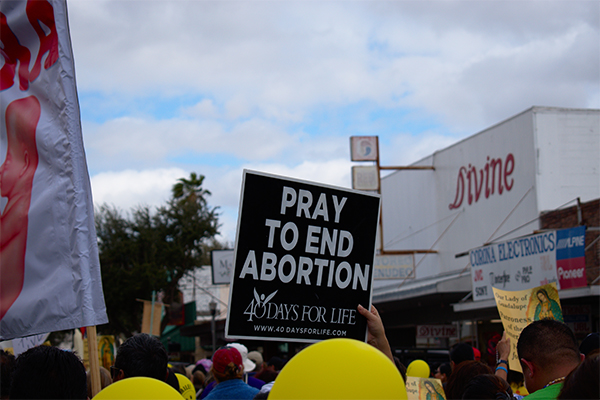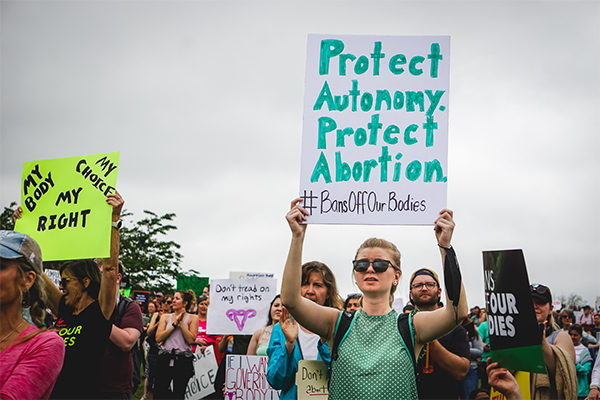Pro-life or pro-choice?
Easy.
Pro-choice.
But then, as several readers of last Sunday’s post (“Abortion Is a Solution”) pointed out, the two options are an unfortunate dichotomy.
One reader said he was pro-choice and pro-life. By pro-life he means a whole range of life-enhancing programs such as healthcare for all, safe neighborhoods for all, decent schools for all, food security for all, equal opportunities for all, justice for all, the abolition of nuclear weapons and the death penalty. And one more: STRICT GUN CONTROL.
Now that’s pro-life!
But don’t count on “pro-lifers” to be proponents of that agenda. Once the baby’s out, mother and child are on their own.
Good luck! God bless!
The dichotomy is unfortunate in another way.
Many pro-life advocates recognize exceptions to abortion bans, such as rape, incest, or endangerment to the mother. Some would allow for abortion early in the pregnancy.
Many pro-choice advocates recognize restrictions, such as disallowing legal abortions after so many weeks (except in extenuating circumstances) because at some point the fetus becomes a person with a right to protection by the state.
By the way, a fetus is human from conception in the sense it’s not bovine or canine. Personhood is another matter. That’s a legal term. Enslaved Blacks were considered “human” but not “persons” according to 18th-century law.
Is a fetus a person?
What is a person?
It is sometimes asked if a human in an irreversible coma is still a person in a meaningful sense. Who gets to decide?
When does a fetus become a person?
Religionists and scientists disagree among themselves as to when the “pop” occurs. And, of course, opinions abound in parlors.
But alas, laws can’t be ambiguous or capricious. Lines must be drawn. (SPEED LIMIT: Whatever! CARBON EMISSIONS: Whatever!)
Many women are rightfully wary of lines barring their autonomy. Three hundred years ago the English jurist, Lord Matthew Hale, ruled that a woman could not encroach on her husband’s rights, which included raping her, because the husband was “sovereign” in his home.
That precedent still pertains in India and did until recently in another former British colony we now know as the United States. (Justice Samuel Alito frequently cites Hale in his draft opinion to overturn Roe v. Wade.)
Women have reason to be alarmed when lawmakers and judiciaries take up their welfare.








An ingredient in the witches’ brew that was being prepared for Macbeth’s benefit was the” finger of a babe / Ditch-delivered by a drab,…” A drab, for the uninitiated, is another word for a prostitute. Of course, birth control was only a pipe dream in Shakespeare’s day. Women have always depended on one another for healthcare. There were specialized midwives who would perform partial-birth abortions using a knitting needle. (I’ll skip the details.) I would imagine that a nice fee accompanied such a procedure and was therefore beyond the financial reach of most “ordinary” women.
In George Elliot’s novel, “Adam Bede,” a young woman is found guilty of killing her newborn by abandoning it beside the road and is sentenced to hang. At the last moment, her sentence is commuted to prison and she is shipped off to a penal colony in Australia. However, she perishes in route and becomes fodder for sharks.
Hypocrisy doesn’t seem to give contemporary social revisionists of the populist-nationalist stripe much of a pause. As Monty Python reminded us in one of their inimitable social- commentary skits, “Every sperm is sacred!” Don’t you forget it; and be careful what you do! Big Brother will be watching.
When I saw the topic I wondered why you’d wade in on abortion. But your writing is so sharp, your mind so clear, your points so on the mark, you disassemble all their arguments.
As Randy points out, there are endless arguments and points of contention on the subject of abortion. However I think Pete Buttigieg had it right . . . He participated in a Fox News town hall event on May 19, 2019 hosted by Chris Wallace. Wallace pressed the Democratic presidential hopeful on recently passed laws in Alabama, Georgia and Ohio that restricted access to abortion.
“Do you believe, at any point in pregnancy, that there should be any limit on a woman’s right to an abortion?” Wallace asked. “I think the dialogue has gotten so caught up on when you draw the line that we’ve gotten away from the fundamental question of who gets to draw the line,” Buttigieg said.”And I trust women to draw the line.”
[It’s a great interview but too lengthy to include in comment window. Google Chris Wallace and Pete Buttigieg to read the rest.–Randy]
I agree with Pete. He didn’t say this but I believe it is true: The Founders knew they couldn’t resolve all the religious differences in the colonies so they pressed ahead by saying there be no state religion, which allowed all parties to believe what they wanted. Today cynical polititians and religious leaders manipulate the abortion issue to their own benefit. They don’t give 2 carrots and a cats rear end about any of it.
It’s interesting that both sides in the abortion debate are “pro-something.” Neither side calls itself “anti-life” or “anti-choice.” The politically-based labels ensure they’ll be arguing past each other. BTW, in the gun-control debate, should one side be called “pro-life” and one “pro-death”?
You immersed us in the complexity of all this. That complexity is not seen by the far right, they can’t seem to see it. The majory of the “pro-lifers” haven’t gone beyond. This is trying to control families, the population at it’s core. Compare the life of women, girls and those around her before Roe vs Wade and then the years after Roe. Steven, I liked your comment. Shakespeare had so much to share with his audiences, and look, he’s still here, giving us a show.
What’s with the media trend to talk about “pregnant people?” As a biologist, I must remind everyone who is unaware that only FEMALE people (=WOMEN) give birth. We need to look no farther than the Taliban’s current action to see what happens when men are in charge of women’s lives. Men don’t give birth. To all men: Butt the f…k out!
Gratifying as a woman to read men who weigh in with such advocacy and publication-worthy writing. Thank you, all.
We may be looking at a new algorithm. We know that pro-choice is not equal to pro-abortion and new gun control laws do not equal eradication of the Second Amendment but these facts are being ignored or simply not understood. It never seemed like graduate level math, but. People who cannot reason the inherent critical distinctions in these two postures have no business in a public life that mandates binding legal decisions. But one thing is certain: The two anti-life trends (ban on abortions and absence of gun laws with teeth to control mass murder), in combination, are a strong right wing statement on how to view “human” vs. “person.” Seems not to be the issue for them they had thought. She says, stunned.
Who draws the line – indeed?!?
I’m pro- woman, pro-man, pro-human, pro – life after birth ( as in all of creation), and tho I am not afraid of death, I am anti-killing of born innocents, which feels consistent… thank you all for your thot provoking musings once again. So wonderful to have this forum…
Good comments, all. I like Shakespeare and Buttigieg. Whatever happened to American Exceptionalism? I guess we’ll find out after abortions are banned, children and Democrats are all gunned down, and those remaining perish in the heat of a climate change Goetterdaemerung!! (apologies, no umlauts on my keyboard)
It would be so refreshing, so freeing, so enlightening if we could hear a free-flowing, unrestricted, non-judgmental discussion among women who have had abortions, women who have had legal and un-legal, professional and back-alley abortions, women who have tried and failed to have an abortion, women who have thought about having an abortion.
Thank you for setting the stage, for researching the history, the restrictions, the religious dictates, the controls set by the government, the censure of the press.
I wonder if our country, founded as it was by radical religious fanatics, will ever be able to calmly discuss anything to do with sex, to do with women, to do with drugs, to do with nature, our constitution, the flaws of of a Capitalist society, the flaws of religion…?